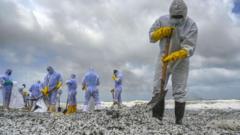Nguyen Thi Ngoc Diem, a victim of Agent Orange in southern Vietnam, embodies the plight of many others affected by the toxic legacy of the Vietnam War. Born with physical deformities attributed to her father’s exposure to Agent Orange, she experienced a brief window of hope when a U.S.A.I.D.-funded project provided her with graphic design training in 2022, leading to employment. However, that promise began to fade with the unexpected closure of her company. Ms. Diem anticipated additional support from the program, such as a small loan or a new computer essential for her work.
The grim reality hit her when she learned that President Trump had decided to freeze U.S.A.I.D. funding and lay off humanitarian agency staff. “It makes no sense,” she lamented, her frail frame confined to a wheelchair, emphasizing the deep sense of loss for those like her who were affected directly by the war’s aftermath. “A little support for people like us means a lot, but at the same time, it’s the U.S.’s responsibility.”
As Ms. Diem clings to the hope for assistance that may never arrive, she underscores a painful irony: the country that deployed the toxic chemical is now withdrawing its support, leaving victims trapped in a cycle of despair and need. With her outdated computer from 2011, which frequently malfunctions, she faces an uncertain future, paralleled by others abandoned in the shadows of history. As discussions of accountability and historical legacy continue globally, the plight of Agent Orange victims emerges as a poignant reminder of unresolved obligations from the past.






















